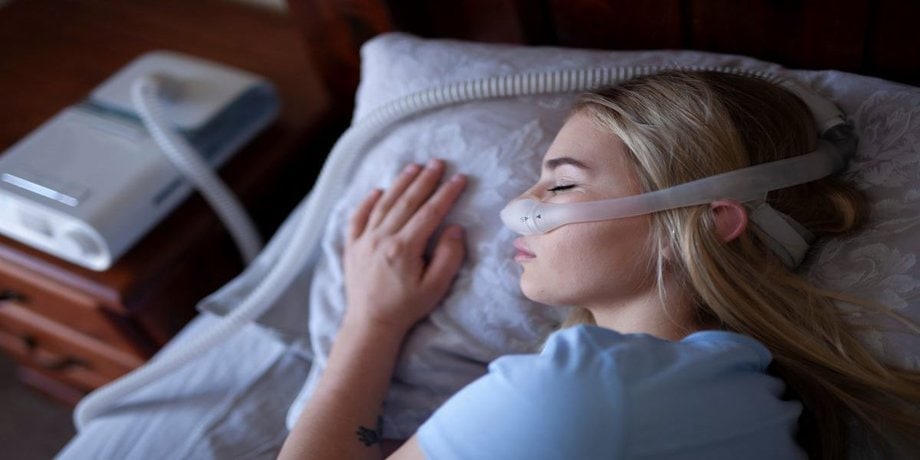Can Sleep Apnea Worsen Chronic Pain Conditions?

Sleep apnea is a common sleep disorder characterized by pauses in breathing during sleep. It is often accompanied by chronic pain conditions, such as fibromyalgia, chronic back pain, and migraines. This article aims to explore the link between sleep apnea and chronic pain, specifically focusing on these three conditions.
By understanding the relationship between sleep apnea and chronic pain, individuals suffering from these conditions can seek appropriate management strategies.
Research suggests that sleep apnea may worsen chronic pain conditions. The interrupted breathing patterns and decreased oxygen levels associated with sleep apnea can lead to inflammation and heightened pain sensitivity. Furthermore, the disrupted sleep caused by sleep apnea can result in poor pain modulation and impaired pain processing. This can exacerbate the symptoms of fibromyalgia, chronic back pain, and migraines, making them more difficult to manage.
It is crucial for individuals experiencing both sleep apnea and chronic pain to seek professional help. Treatment options such as continuous positive airway pressure (CPAP) therapy for sleep apnea can improve both sleep quality and pain levels. By addressing sleep apnea, individuals may experience relief from their chronic pain conditions, enhancing their overall quality of life.
Key Takeaways
- Sleep apnea is commonly accompanied by chronic pain conditions such as fibromyalgia, chronic back pain, and migraines.
- Disrupted sleep caused by sleep apnea can result in poor pain modulation and impaired pain processing.
- Sleep apnea may worsen chronic pain conditions due to fragmented sleep and decreased oxygen levels.
- CPAP therapy can potentially improve chronic pain conditions by reducing apnea episodes and improving oxygen levels during sleep.
Understanding Sleep Apnea
Sleep apnea, a common sleep disorder characterized by pauses in breathing during sleep, is important to understand in order to explore its potential impact on chronic pain conditions.
Sleep apnea occurs when the muscles in the throat relax and obstruct the airway, leading to breathing pauses that can last for a few seconds or even minutes. These pauses can occur multiple times throughout the night, disrupting the normal sleep pattern and causing excessive daytime sleepiness.
Sleep apnea has been associated with various health issues, including cardiovascular diseases, metabolic disorders, and cognitive impairments. However, its relationship with chronic pain conditions is still not fully understood.
Some studies suggest that sleep apnea may worsen chronic pain conditions, possibly due to the fragmented sleep and decreased oxygen levels that occur during apnea events.
Further research is needed to elucidate the complex relationship between sleep apnea and chronic pain conditions.
Exploring Chronic Pain Conditions
Research has shown that individuals who suffer from sleep apnea may experience a heightened sensitivity to discomfort and reduced pain tolerance. This suggests that sleep apnea may worsen chronic pain conditions.
Chronic pain conditions are characterized by persistent pain that lasts for more than three months and can significantly impact a person’s quality of life. Sleep apnea has been found to be associated with several chronic pain conditions, including fibromyalgia, migraines, and temporomandibular joint disorder (TMJ).
- Fibromyalgia: Sleep apnea can worsen the symptoms of fibromyalgia, such as widespread pain, fatigue, and sleep disturbances.
- Migraines: Sleep apnea has been linked to an increased frequency and severity of migraines.
- TMJ: Sleep apnea can contribute to jaw pain and dysfunction, which are characteristic symptoms of TMJ.
Overall, the relationship between sleep apnea and chronic pain conditions is complex and requires further research to fully understand the underlying mechanisms.
The Link between Sleep Apnea and Chronic Pain
The correlation between sleep apnea and chronic pain has been a subject of interest, with studies revealing a potential connection between these two phenomena. Sleep apnea is a sleep disorder characterized by pauses in breathing or shallow breaths during sleep, leading to disrupted sleep patterns and lower oxygen levels. Chronic pain conditions, on the other hand, refer to persistent pain that lasts for more than three months. Research suggests that sleep apnea may worsen chronic pain conditions, as the interrupted sleep and reduced oxygen levels can lead to increased inflammation and heightened pain sensitivity. A study conducted by Smith et al. (2016) found that individuals with sleep apnea reported higher pain intensity and greater interference with daily activities compared to those without sleep apnea. While the exact mechanisms underlying this relationship are still being investigated, addressing sleep apnea may be crucial in managing chronic pain conditions.
| Column 1 | Column 2 | Column 3 | Column 4 | Column 5 |
|---|---|---|---|---|
| Sleep apnea | Chronic pain | Disrupted sleep patterns | Lower oxygen levels | Increased inflammation |
Sleep Apnea and Fibromyalgia
The potential association between fibromyalgia and sleep apnea has been a subject of investigation, with studies exploring the relationship between these two phenomena.
Fibromyalgia is a chronic pain disorder characterized by widespread musculoskeletal pain, fatigue, and sleep disturbances.
Sleep apnea, on the other hand, is a sleep disorder characterized by recurrent episodes of breathing cessation during sleep.
Several studies have suggested a potential link between these two conditions, with some indicating that sleep apnea may worsen fibromyalgia symptoms.
One possible explanation for this association is that the disrupted sleep patterns and oxygen deprivation caused by sleep apnea can exacerbate the pain, fatigue, and cognitive dysfunction experienced by fibromyalgia patients.
However, further research is needed to fully understand the relationship between sleep apnea and fibromyalgia and to determine the underlying mechanisms that may contribute to their co-occurrence.
Sleep Apnea and Chronic Back Pain
One possible connection between sleep disturbances and musculoskeletal discomfort requires further investigation. Specifically, the relationship between sleep apnea and chronic back pain is an area of interest. Sleep apnea, characterized by recurrent interruptions in breathing during sleep, has been suggested to worsen chronic pain conditions, including back pain. While the exact mechanisms underlying this relationship are not fully understood, several potential factors have been proposed.
- Sleep deprivation: Sleep apnea can lead to fragmented sleep and chronic sleep deprivation, which in turn can contribute to increased pain sensitivity and the development and maintenance of chronic pain conditions.
- Inflammation: Sleep apnea has been associated with increased inflammation in the body, and chronic inflammation has been implicated in the development and progression of chronic pain.
- Central sensitization: Sleep disturbances, including sleep apnea, may contribute to central sensitization, a phenomenon in which the nervous system becomes more sensitive to pain signals, leading to increased pain perception.
Further research is needed to fully elucidate the relationship between sleep apnea and chronic back pain and to determine the potential therapeutic implications for individuals suffering from both conditions.
Sleep Apnea and Migraines
Further investigation is necessary to explore the potential link between sleep disturbances associated with interrupted breathing during sleep and the occurrence of migraines, evoking a sense of curiosity and urgency in the audience.
Sleep apnea, a common sleep disorder characterized by repeated interruptions in breathing during sleep, has been linked to various health conditions, including chronic pain. While the relationship between sleep apnea and chronic back pain has been studied, limited research exists on the association between sleep apnea and migraines. However, some studies have suggested a possible connection.
Sleep apnea may trigger migraines through the release of inflammatory substances, alterations in cerebral blood flow, or disruptions in sleep patterns. Further research is needed to establish the strength and nature of the relationship between sleep apnea and migraines, as well as to explore potential mechanisms underlying this relationship.
Managing Sleep Apnea and Chronic Pain
This discussion will focus on the management of sleep apnea and chronic pain through medical interventions, lifestyle changes, and complementary therapies.
Medical interventions may include the use of continuous positive airway pressure (CPAP) machines or oral appliances to improve breathing during sleep and alleviate sleep apnea symptoms.
Lifestyle changes such as maintaining a healthy weight, practicing good sleep hygiene, and avoiding alcohol and sedatives can also help manage both sleep apnea and chronic pain.
Additionally, complementary therapies like acupuncture, yoga, and meditation may provide additional relief and support in managing these conditions.
Medical Interventions
Medical interventions, such as continuous positive airway pressure (CPAP) therapy, have been shown to alleviate symptoms of sleep apnea and potentially improve chronic pain conditions. CPAP therapy involves wearing a mask over the nose or mouth during sleep, which delivers a constant flow of air to keep the airways open. This treatment method helps to reduce the number of apnea episodes and improve oxygen levels during sleep. By ensuring adequate oxygenation and uninterrupted sleep, CPAP therapy can alleviate pain sensitivity and improve overall quality of life for individuals with both sleep apnea and chronic pain conditions. Research has demonstrated that CPAP therapy can lead to a reduction in pain intensity and frequency, as well as improvements in daytime functioning. However, further studies are needed to fully understand the mechanisms underlying the relationship between sleep apnea and chronic pain, as well as the specific effects of CPAP therapy on pain management.
| Pros of CPAP Therapy | Cons of CPAP Therapy |
|---|---|
| Effective in reducing apnea episodes | Can be uncomfortable to wear during sleep |
| Improves oxygenation and sleep quality | Requires adherence to long-term treatment |
| Potential to alleviate pain sensitivity | May cause dryness or nasal congestion |
Lifestyle Changes
One effective approach to managing sleep apnea and improving overall well-being is through implementing lifestyle changes. Sleep apnea is a chronic condition that can significantly impact an individual’s quality of life and exacerbate chronic pain conditions.
Lifestyle modifications such as maintaining a healthy weight, regular exercise, and avoiding alcohol and sedatives can help alleviate symptoms of sleep apnea and potentially reduce the severity of chronic pain. Weight loss is particularly crucial as excess weight can contribute to the development and progression of sleep apnea.
Engaging in regular physical activity can also aid in weight management and improve sleep quality. Additionally, avoiding alcohol and sedatives can prevent the relaxation of throat muscles, reducing the occurrence of sleep apnea episodes.
By adopting these lifestyle changes, individuals with sleep apnea may experience an improvement in their overall well-being and potentially alleviate the impact of chronic pain conditions.
Complementary Therapies
Complementary therapies offer potential benefits in managing sleep apnea and enhancing overall well-being, providing individuals with alternative methods to alleviate symptoms and improve their quality of life. These therapies can be used in conjunction with conventional treatments to maximize the effectiveness of the treatment plan.
Here are five examples of complementary therapies that have shown promise in alleviating sleep apnea symptoms:
- Acupuncture: This ancient Chinese practice involves inserting thin needles into specific points on the body to stimulate energy flow and promote relaxation.
- Yoga: Regular practice of yoga poses and breathing exercises can help improve respiratory function, reduce stress, and promote better sleep.
- Massage therapy: Manipulating the muscles and soft tissues can help relax the body, relieve tension, and improve breathing patterns.
- Herbal remedies: Certain herbs, such as valerian root and chamomile, have calming effects and can aid in better sleep.
- Meditation: Practicing mindfulness meditation can help reduce stress, improve sleep quality, and enhance overall well-being.
It is important to note that while these complementary therapies may offer benefits, they should be used under the guidance of a healthcare professional and should not replace conventional treatments for sleep apnea.
The Importance of Seeking Professional Help
Seeking professional assistance is crucial in addressing the significance of managing sleep apnea in relation to chronic pain conditions. Professionals, such as sleep specialists, can accurately diagnose sleep apnea and provide appropriate treatment options. They can conduct comprehensive evaluations to determine the severity of sleep apnea and identify any underlying causes that may contribute to chronic pain.
Moreover, professionals can offer guidance on lifestyle modifications and recommend therapy options tailored to the individual’s specific needs. The expertise of healthcare providers is essential in monitoring the progress of treatment and making necessary adjustments to ensure optimal management of both sleep apnea and chronic pain.
Without professional help, individuals may not receive the necessary support and knowledge needed to effectively manage their conditions, potentially exacerbating the impact of sleep apnea on chronic pain.
Frequently Asked Questions
What are the common symptoms of sleep apnea?
The common symptoms of sleep apnea include loud snoring, gasping or choking during sleep, excessive daytime sleepiness, morning headaches, and difficulty concentrating. Other symptoms may include irritability, mood changes, and dry mouth upon waking.
How is sleep apnea diagnosed?
Sleep apnea is typically diagnosed through a combination of medical history, physical examination, and sleep studies. Polysomnography is the gold standard test, which measures various physiological parameters during sleep to determine the severity of the condition.
Are there any natural remedies or lifestyle changes that can help manage sleep apnea?
Natural remedies and lifestyle changes can help manage sleep apnea. These may include weight loss, regular exercise, avoiding alcohol and sedatives, sleeping on your side, using nasal strips or devices, and maintaining a consistent sleep schedule.
Can sleep apnea be cured?
Sleep apnea cannot be cured, but it can be effectively managed. Treatment options include continuous positive airway pressure (CPAP) therapy, oral appliances, and surgery. Lifestyle changes such as weight loss and avoiding alcohol and sedatives may also help.
Are there any long-term complications associated with untreated sleep apnea?
Untreated sleep apnea can lead to several long-term complications, including increased risk of cardiovascular diseases, hypertension, stroke, diabetes, and cognitive impairment. Regular treatment and management are essential to prevent these potential complications.










